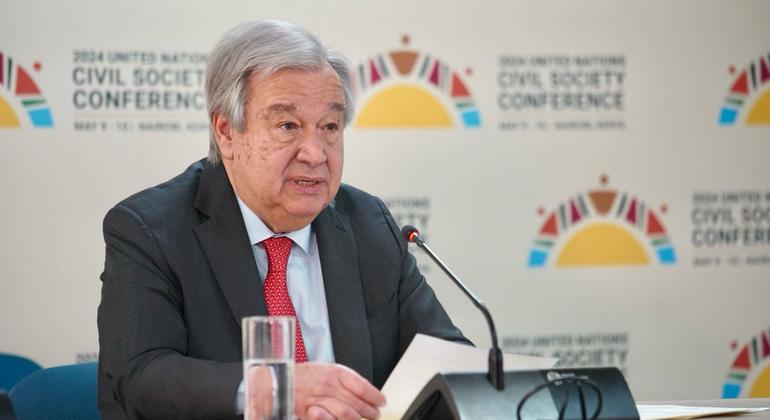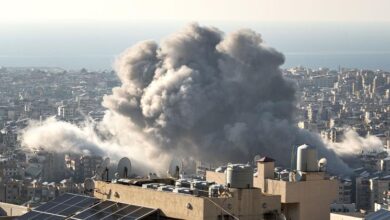In Nairobi, Guterres reiterated his call for an end to the war in Gaza

Speaking at a press conference in Nairobi, Mr warning that “the fate of Palestinians and the entire region hangs in the balance.”
More than a million Palestinians are gathering in Rafah Governorate in southern Gaza as Israeli military operations continue across the region. About 100,000 people have left and are moving north.
“A major ground attack on Rafah would lead to a horrifying humanitarian disaster and hamper our efforts to assist people with famine looming,” he said.
UN involvement continues
The United Nations is actively engaging with all parties to resume the delivery of life-saving aid to the enclave, including much-needed fuel, through the Rafah and Kerem Shalom crossings.
Meanwhile, key medical facilities in Rafah may soon be inaccessible or inoperable, including the only dialysis unit still operating in Gaza. At the same time, humanitarians in the South no longer had tents or food warehouses.
Emphasizing international humanitarian law clearly, he said civilians must be protected, especially vulnerable people who cannot be displaced from ongoing fighting, such as pregnant women. pregnant women, children, injured people, sick people, elderly people and disabled people.
‘Consequences’ in the West Bank
As “what happens in Gaza has a profound impact on the occupied West Bank”, the UN chief also noted “a worrying increase in settler violence, the Israel uses excessive force, destruction and expulsion” within the territory.
“All of this shows the need for the international community to speak with one voice for an immediate humanitarian ceasefire in Gaza, the immediate and unconditional release of all hostages,” he said. as well as increasing aid to save lives.”

IOM and the Kenya Red Cross, with a generous contribution from Japan, are supporting displaced people in Tana River, Kenya with shelter and essential household items.
Solidarity with Kenya
The Secretary-General spoke to reporters in the Kenyan capital before closing the conference UN Civil Society Conference held there this week.
Expressing solidarity with the people, he sent his deepest condolences to those affected by this earthquake. devastating floods domestically and elsewhere in East Africa.
He said the United Nations will continue to support the Government’s relief efforts.
Concerns for Sudan
Mr. Guterres also addresses conflicts in Africa that are “tearing lives and communities apart.”
He expressed particular concern about There is a war going on in Sudanwhere nine million people have fled their homes and famine is looming in Darfur.
Violent clashes in El Fryer are preventing aid from arriving and an attack on the city would cause heavy damage to civilians, he said.
The UN chief was also very concerned by reports of escalating violence in the states of North and South Kordofan and Al Jazirah.
He called on all parties to comply with international humanitarian law, protect civilians and facilitate full and unrestricted humanitarian access.
‘Getting Sudan back on track’
“Ultimately, we know that there is no military solution to this conflict. We need an urgent, coordinated international effort to put in place a political process that can get Sudan back on track,” he said.
In this regard, he welcomed the steps taken to end the conflict, including the efforts of the East African Bloc IGAD, the African Union, the League of Arab States and through the negotiations held in Jeddah, Saudi Arabia.

Participants gather at the opening ceremony of the United Nations Civil Society Conference, held at the United Nations Office in Nairobi, Kenya, from 9 to 10 May 2024.
Kudos to civil society
The Secretary-General participated in the United Nations Civil Society Conference held over the past two days and attracted about 1,500 participants.
IN comment At the closing ceremony, he thanked representatives for their work, noting that he had witnessed the enormous impact of civil society in every corner of the world.
He also admitted that many of them work at great personal risk.
“Climate activists are being criminalized and persecuted; human rights defenders are threatened; and humanitarians are killedhe say.
Call for reform
Mr. Guterres called on civil society to continue working with the United Nations to build a better world amid ongoing crises, including conflict, climate chaos and other threats. threat to sustainable development.
While these challenges require collective solutions, the current international system is “not up to the task,” he said, stressing the need for reform, including of the financial system. “dysfunctional and unjust” international politics.
“We need to reform and restore multilateralism so that it reflects today’s realities and is fit to face the challenges ahead,” he said.
Future Summit
He pointed Future Summitwill be held at United Nations Headquarters in September, as “a pivotal moment to advance our vision of a renewed multilateralism.”
Among the goals are “accelerating” sustainable development, freeing up finance for climate action and development, and accelerating progress on reform of the international financial architecture.
Other areas of action include considering future generations in today’s decision-making, closing the digital divide, prioritizing conflict prevention and working towards a nuclear-free world.
“The Future Summit is an opportunity to drive progress on issues that matter to you – and to us,” he said. “Together, let’s seize this opportunity and make the Future Summit truly meaningful.”




